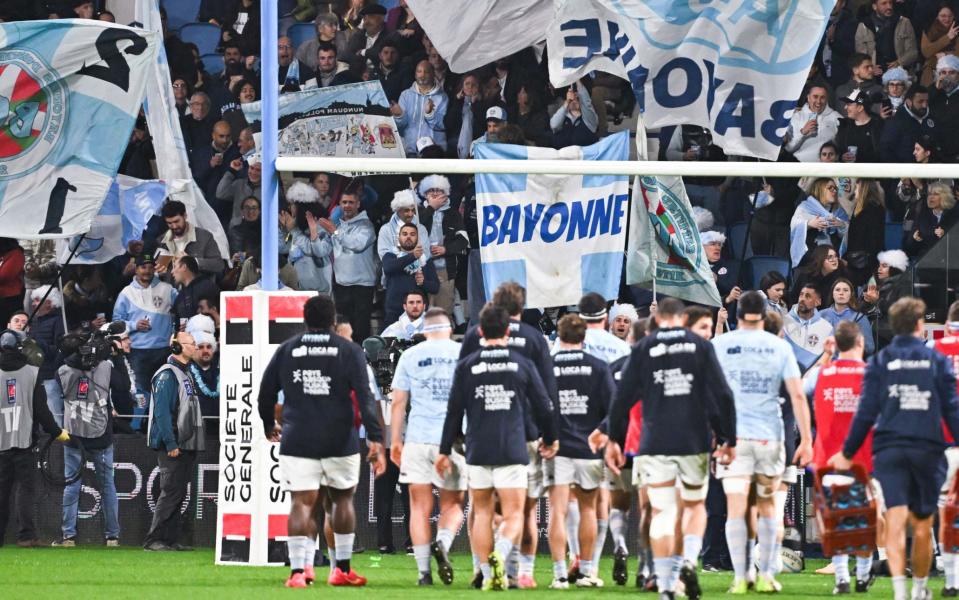Manu Tuilagi has made right call – Bayonne is the best place to watch rugby in the world

The roll-call of French rugby clichés is vast but it is not what it once was. In the era of ultra-professionalism, the tales of biting and gouging have thankfully disappeared, the days of pre-match wine for the players are over, and the concept of a home loss – once anathema to a town’s denizens – has become more palatable in an increasingly globalised world. French rugby, when compared against its rivals, remains the most culturally rich, wonderfully idiosyncratic and emotionally tribal – with the Top 14 and ProD2 the standard bearers of global domestic rugby – but there has been undoubted dilution when compared to the brutality and parochiality of its amateur era.
Yet, there remains something almost indefinably alluring and mystical about French rugby – known as l’Ovalie in France – and of all my travels in this fine country – of the 30-plus towns and stadiums in which I have either played or spectated – there is nowhere which embodies the true distillation of l’Ovalie like Bayonne. For years considered the baby brother of the neighbouring Biarritz Olympique, with no domestic title to speak of since 1943, Aviron Bayonnais – to give the club its full moniker – has grown into a Basque behemoth, the gold standard of a rugby town with an almost unrivalled commitment to their club; and the gold standard of the reverse, too. There is no Bayonnais billionaire, just a town full of fanatics, bursting with pride for both their town and club.
Famed for its raucous summer festival and its delicious jambon and chocolat, Bayonne is a working town in south-west France at the confluence of the Ardour and Nive rivers, seven kilometres inland from the Atlantic. Both on and off the field, Bayonne has spent a considerable time in the shadow of neighbouring Biarritz, the glamorous coastal town a stone’s throw away; but, today, Biarritz slug it out in the second tier of French rugby – without making too strong a fist of it – while Bayonne fly the Basque flag as an established name in the Top 14. Given there are just six kilometres between the two stadiums, the rivalry between the two is fierce, verging on toxic. On a recent visit, my second in six months, when asked their thoughts on Biarritz, one local said they did not understand the question, another that they had never heard of it, while another blew a raspberry. One sensed they were only half-joking.
Although not among the likes of Toulouse or Racing 92 as the league’s big-spending heavyweights, even without a squad full of superstars, Bayonne trumps towns such as Castres, La Rochelle and Clermont-Ferrand in terms of matchday experience. This Basque town, full of boutiques, brasseries and bon vivants, is the lesser-known jewel in French rugby’s crown; the best place I have ever watched a domestic rugby match. Manu Tuilagi and, perhaps, Danny Care will be in for a treat next season.

The reasons are endless. Let us begin with Bayonne’s bonkers season. The concept of a home loss might have become more palatable among France’s professional clubs but Bayonne’s Stade Jean-Dauger – the club’s fabled stadium named after their famous centre – is the embodiment of a French fortress. Bayonne are unbeaten at home this season – Toulouse and league leaders Stade Français among those to have come a cropper – but have not won a single match away. Ninth out of 14 in the table and unbeaten at home, the latest victory a one-point nail-biter over European champions La Rochelle.
I had the privilege – given that tickets for one of the Jean-Dauger’s 14,370 seats are as rare as a poor French cheese – of attending last Saturday’s La Rochelle victory with four friends, the latest iteration of the rugby road trip that I wrote about in these pages last year. It was a cup final atmosphere, the match the talk of the town even at 1pm on Saturday ahead of a 9pm kick-off, with jerseys from both teams filling up the streets. While lunching at the quaint Dacquois in the town’s cobbled centre, sundry fans passed by, decked out in club shirts, neckerchiefs or berets, heading to the Vestiaire bar near the stadium which was pumping even seven hours before kick-off. Aviron Bayonnais’ colours are white and blue and if you cut the people of this town on matchday they bleed them.

“We are lucky geographically, with a club in the centre of town,” says Philippe Tayeb, Bayonne’s president. “That has led to an even greater marriage between the club and the fans. They are the best fans – because they’re ours. They’re there for the good and the bad times – and that’s important. They’re there when we win and they’re there when we lose and that’s so important for the players. They are so loyal.”
Bayonne might not be as chic as neighbouring Biarritz but it is every bit as charming, the local Bayonnais people among the most hospitable, welcoming and loquacious in the whole of France. A faux compliment? Perhaps, but the Basques are different, an almost mystical race, origins unknown, straddling the border with Spain. For example, while soaking up the pre-match atmosphere in the courtyard of Des Basses Pyrénées, a Bayonne director overheard a conversation about our road trips and was so taken aback by our commitment to the French rugby cause that he frog-marched us to the club shop around the corner and furnished us with a Bayonne jersey and beret each – free of charge. We did offer to pay, of course, but the director refused and, I must add, he was unaware at that stage that I was a rugby writer. It was a remarkable show of generosity and rugby spirit.


All this, too, before even mentioning La Peña Baiona, the club’s hair-raising anthem which is sung before every match and now, owing to its uplifting melody and riotous chorus, has grown into the unofficial hymn of the French team, heard vociferously at every Les Bleus fixture.
#TOP14 #ABST - J9
De jour comme de nuit avec la Peña Baiona les frissons sont toujours là 🤩 Magnifique instant de communion avant le coup d'envoi d'@avironrugbypro contre le @StadeToulousain 👏 pic.twitter.com/wbeDTQYAhN— TOP 14 Rugby (@top14rugby) October 29, 2022
How peculiar that the paean of a particular club has evolved into the national side’s soundtrack. It is the equivalent of the Mighty Quin accompanying England matches. If anything, due to the geographical proximity, that would be more sensible given that Bayonne is 750 kilometres from Paris. “La Peña Baiona spans generations and cultures,” says Tayeb. “It was such an honour to hear it become the anthem of last year’s World Cup.”
That is the Bayonne effect; one which has not just left their great rivals Biarritz reeling, but one which has created French rugby’s greatest carnival.

